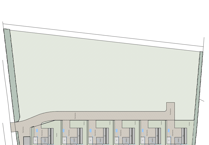PA23/09509: AN application for a certificate of lawfulness for the proposed use of a development for an infill extension at the south and east elevations of an existing house, roof alteration, roof replacement and construction of an integral garage including a general refurbishment at a property in Davidstow has been refused by Cornwall Council.
Mr Timothy Seymour applied to the local authority for the certificate of lawfulness, which typically means the work requested has been in place for long enough without planning permission, usually ten years, for the property at The Old Chapel, Trewassa, Wassa Lane, Davidstow, Camelford.
It was refused by the Council as in its view, permitted development rights were removed from the property in a previous application.
The permission, for the refurbishment of the chapel, was decided in March 1989. Conditions in the permission prevented the erection of a garage within the curtilage of the dwellinghouse, with a further condition stating that no works for the enlargement, improvement or other alterations can take place without further permission from the local authority.
However, the application was not granted by Cornwall Council, who said that full planning permission would be required due to the existence of the conditions from the 1989 planning permission.
A planning officer told the applicant: “Two conditions of the original consent for the refurbishment of the chapel to permit domestic use (E1/89/0284) removed permitted development rights, of those relating to the construction of a garage and of those relating to external alterations.
“Condition five of E1/89/0284 states: ‘Notwithstanding the provisions of the Town and Country Planning General Development Order 1988, no garage shall be erected within the curtilage of the dwellinghouse hereby permitted without the express consent of the Local Planning Authority.’
“Condition six of E1/89/0284 states: ‘Notwithstanding the provisions of the Town and Country Planning General Development Order 1988, no works for the enlargement, improvement or other alterations of the dwelling(s) hereby permitted, other than works which do not materially affect the external appearance of the building, shall be carried out without the express consent of the Local Planning Authority.’
“The proposed works are considered to be in breach of these conditions, and therefore would not be lawful. The proposals would require the benefit of a grant of planning permission.”
PA24/00722: PLANS for the conversion of an existing pub with twelve rooms into dwellings has been submitted to Cornwall Council.
Karl Pearce has submitted plans to the local authority for the conversion of the pub, known as the Fourways Inn, on Churchtown Road, St Minver, Wadebridge into six properties.
They would comprise of three two-bedroomed houses, one studio flat, one three-bedroomed house and one four-bedroomed house. It has been closed as a pub since approximately September 2023.
In the application to the Council, the applicant said: “Fourways Inn is a former pub/hotel located on the crossroads of St Minver, Cornwall. The existing building is understood to date back to the 18th Century in parts. It comprises a collection of buildings all interlinked together. The most recent use of the building is a pub/hotel with up to 12 rooms for guests.
“The proposal is to create 6 no. Residential units within the existing fabric of the building. Fourways Inn is located in the village of St. Minver, on a prominent corner plot.
“The building has a distinct character, with white painted stone walls and a slate roof. The existing building is currently used as a pub and Restaurant with eight en suite rooms. There is a further two-bedroom cottage and a two bedroom apartment. The building has residential properties to the South and West. The Inn has been extended over the years to extend the accommodation. The proposal preserves the character of the existing building. There are no changes to the highway facing elevations. To the rear of the building, the proposal removes an area of flat roof extension and creates new openings at ground floor only.”
A previous pre-application for the development stated: “In summary it is considered that the change of use of the building for residential development could potentially be encouraged. The building known as Fourways Inn is a prominent building in the street scene carrying a lot of local history and minimal external changes would be considered most appropriate.
“The site is within the settlement boundary as identified within the NDP and a scheme to convert the public house would reuse the building/site in order to provide much needed housing, particularly during a recognised housing crisis which weighs in favour of the scheme. Accordingly, given the location, site context and policy presumption it is considered that the principle for the development is acceptable”.
The applicant added: “Fourways Inn is a beautiful character building, and a recognised building within the village.
“We feel that the proposal to retain the look and character of the building in its entirety, to provide additional residences in an area which has significant targets still to be met, should be considered as ‘Sustainable Design and looked on favourably by the Local Authority.
“The applicant is keen to provide good quality accommodation for the community and preserve the character of the village.”
The plans have been met by objections locally. Mrs Louise McWilliams said: “This village has been decimated by second homes and holiday lets. There is a need for restraint in St Minver, no further unessential buildings / conversions are needed.
“There is a need for local housing, strictly for local people, affordable in price, not shared ownership debt traps, and especially not overpriced (the last four houses built and sold in the village were priced over £630,000 each!).
“There are also very few amenities left in the village, and to lose an inn that has over 300 years of history is a travesty in itself. Some careful thought is needed, alongside the fact that if the inn had been put up for sale as it stands at a more realistic price, it would have been sold to an interested party to continue it as it was intended. It’s time for the council to stand firm and put a stop to those who are chasing short term gain at the expense of Cornwall’s future.”
Mrs Rachel Phillips added: “We don’t need more holiday homes or second homes in this area. We need affordable homes for local people, these will not meet that criterion. We are losing a local pub and a local eatery for yet more holiday homes.”
PA23/03130: A RETROSPECTIVE planning application for the sub-division of an existing two-bedroomed flat to create two one-bedroomed flats and all associated works for a property in Bodmin has been refused by Cornwall Council’s planning department.
Jason Gregg applied to the local authority for permission to undertake the works at their property at 40A Fore Street, Bodmin.
They sought to change the property, formerly a four-bedroomed property that had been divided into two numbered two-bedroomed units, and were now seeking to further sub-divide one of the two-bedroomed flats into two one-bedroomed dwellings.
However, the application, despite the support of Bodmin Town Council, who said: “Bodmin Town Council support the application for retrospective permission”, was refused amid concerns about the level of phosphates in the River Camel hydrological catchment.
The council said that the applicant had failed to give sufficient details about the impact their development would have on the nutrient levels, and thus failed to demonstrate it would not have a negative impact. They said that in the event of a failure of a proposal to provide sufficient details and demonstration otherwise of doing so, they must take a precautionary approach and refuse planning permissions that breach this.
A planning officer said: “It is considered that the proposal does not amount to sustainable development and conflicts with the development plan policies when read as a whole and is therefore recommended for refusal.”
In refusing the application, Cornwall Council’s planning officers told the applicant: “The application site is within the hydrological catchment of the River Camel which is designated as a Special Area of Conservation under the Habitat Regulations 2017.
“The designated site is considered to be in unfavourable condition due to high levels of phosphates.
“ Insufficient details of the site’s impact upon phosphate levels to the River Camel Special Area of Conservation have been submitted to demonstrate that this proposal would not result in an increase in phosphate levels.
“Given the failure of the proposal to provide sufficient details, and until demonstrated otherwise, the precautionary principle must prevail in favour of nature conservation.
“The development is contrary to the Conservation of Habitats and Species Regulations 2017, para 186 (a) of the NPPF which states that planning permission should be refused if significant harm to biodiversity cannot be avoided, or as a last resort, compensated for and policies 1, 22 and 23 of the Cornwall Local Plan Strategic Policies 2010-2030.”





Comments
This article has no comments yet. Be the first to leave a comment.